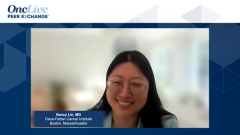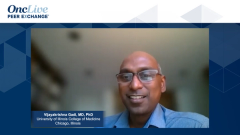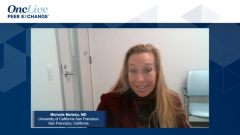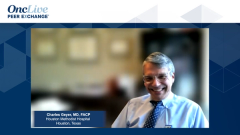
Treatment Options for HER2+, ER+ Metastatic Breast Cancer
A panel of experts briefly reviews the treatment options available for patients with ER+, HER2+ metastatic breast cancer.
Episodes in this series

Vijayakrishna Gadi, MD, PhD: I’m going to go with that a little further. So Nancy, when you think about hormone-positive, HER2-positive disease, so maybe luminal B, you’ve got all the HER2 alterations that can happen, and we can chase those with new drugs. But on the other end of the spectrum, you have ER [estrogen receptor]. We have ESR1 mutations, we have the entire PI3K/Akt/mTOR pathway, we have the CDK4/6 pathway, we have SERD [selective estrogen receptor degrader]. Do you see a day where we keep the HER2 therapy stable and then chase these others? I think it is going to be impossible to test all the possibilities here. Break this down for us.
Nancy Lin, MD: It’s a great question because I think we saw the elacestrant data from the San Antonio Breast Cancer Symposium, that was in ER-positive HER2-negative patients. But clearly elacestrant was, at least proof-of-concept wise, a bit better, not dramatically better, but a bit better than fulvestrant. I don’t know what the plans are for elacestrant in the HER2-positive space. But I think in the spirit of thinking about the maintenance phase, where we typically give an antibody alone and sometimes we add an AI [aromatase inhibitor] for good measure, is there a value in adding a better endocrine agent? Fulvestrant, although people do use it sometimes in clinical practice, it’s obviously difficult to time with trastuzumab because the cycle length is different, and it’s a huge pain. I think that is really an interesting question.
Similarly, there are novel CDK inhibitors that are trying to overcome CDK resistance, so CDK2/4/6 inhibitors. Is there role for those types of agents in HER2-positive disease because there are many data that CDK4/6 is one of the mediators of HER2 resistance, and can you combine endocrine, a better CDK inhibitor, and HER2-based therapy and come up with a nonchemotherapy-based regimen? I think that is possible. The challenge is that there are fewer patients with HER2-positive metastatic breast cancer, and so there aren’t an unlimited number of clinical trial combinations one can try. Maybe that’s where preclinical colleagues can be most helpful, trying to sort through what is the best combination to bring into clinical trials, just knowing that there is a finite number of trials that we can do.
Charles Geyer, MD, FACP: I do think the SERDs are particularly interesting in that regard. Preclinical models years ago suggested that maybe fulvestrant as a SERD would be better than just eliminating the estrogen from the experiment, or that using the SERDs might be the best thing to get rid of the receptor when you’re getting all the cross talk, but it just wasn’t practical to look at it. For me, I think we’re going to have to look at SERDs in the triple-positive space, to go back and do studies we wanted to do 15 years ago but just wasn’t practical.
Vijayakrishna Gadi, MD, PhD: I thought when I looked at the elacestrant data; I still have to digest it. We obviously need papers and things to look at, but the medians didn’t differ a lot. But when you looked at the landmarks, 12 months, 18 months, those lines stayed apart. There’s a group of patients out there, is it the mutation carrying patients? I think all of that’s going to be determined, and can you suppress subsequent mutations from occurring as well? Those are all translational things I think we'll learn in the coming months.
Transcript edited for clarity.










































